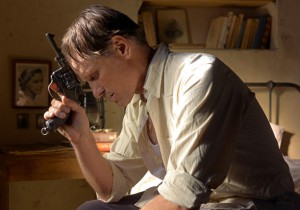 Viggo Mortensen has been doing a bunch of press at the Venice Film Festival for a new film called Far From Men — a story about two men, a schoolteacher and a murderer, caught up in Algeria’s 1954 war for independence — that opens in France in January next year.
Viggo Mortensen has been doing a bunch of press at the Venice Film Festival for a new film called Far From Men — a story about two men, a schoolteacher and a murderer, caught up in Algeria’s 1954 war for independence — that opens in France in January next year.
In another tangential link to Wellywood, the score is composed by Nick Cave and Warren Ellis, who also did the soundtrack for the Peter Jackson-produced documentary film West of Memphis. Read below for an early review from Indiewire, but if the idea of Mortensen speaking French appeals, this is one you probably won’t want to miss. Thanks to Ringer Davidsenex for the heads-up.
Taking the conventions of Western films to different countries, planets, time periods or political situations is hardly new, but when it’s done well, it never gets old. The French-language “Far From Men,” aka “Loin des Hommes,” from writer/director David Oelhoffen, which transposes classic Western archetypes to the Algerian Civil War, is a terrific reminder of just that. It does not reinvent the wheel, nor is it a po-mo deconstruction of the Western myth or a pastiche.
It is simply a great, traditional Western: the language and cultural details may be different, but the sparse elegance and moral conundrums are familiar and as resonant as ever. Based on Albert Camus’ short story “The Guest” and boasting a fitting yet never clichéd soundtrack by Nick Cave and Warren Ellis and a pair of flawless lead performances from Viggo Mortensen and Reda Kateb, “Far From Men” is a quietly grand, beautiful film.
It is 1954, just after the outbreak of the Algerian war of Independence, and Daru (Mortensen) is a schoolteacher in a remote rural area; a little schoolhouse, also his home, seems to be the only building for miles and his class is composed of the children of local goatherders. One night a gendarme arrives with a prisoner in tow. The policeman warns Daru of the approaching insurgent native Algerians revolting against French colonial rule.
He also forces Daru, an ex-army Major, to take charge of the prisoner, Muhammad (Kateb), who having killed his cousin, is to be transported to the city to stand trial and inevitably face execution. That journey, the burgeoning relationship between the two men, and their encounters with friends and foes along the way (often friends who now wear the colors of foes, as Daru discovers that many of the men he served with now fight the French forces he nominally represents), forms the backbone of the elegant plot.


